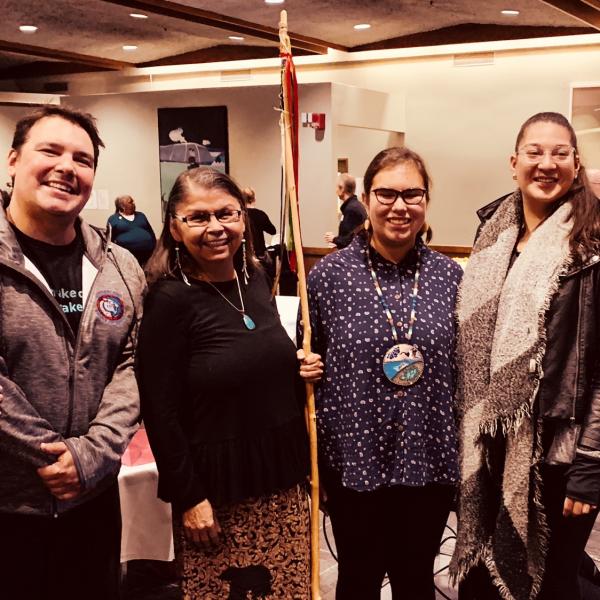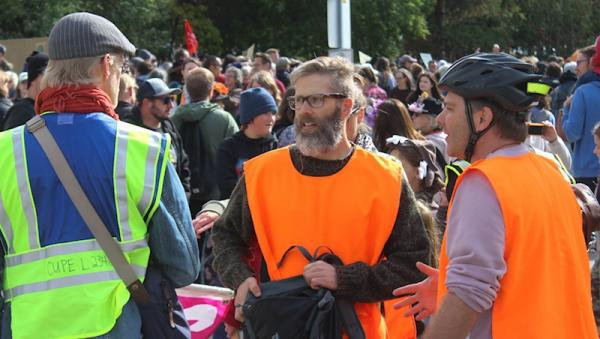
Four Indigenous Life Defenders—Niigaan, Gramma, Sarah, Sadie
by Steve Heinrichs
We are not environmentalists.
We are not protestors.
We are life defenders.
And we do this for all.
One week after the Global Climate Strike, a week after a million took to the streets in Canada with some 10-12,000 marching in the city of Winnipeg, I’m facilitating a panel conversation on intergenerational activism with four brilliant Indigenous teachers, pray-ers, and warriors. They are diverse in age (ranging from 63 to 13), from different nations, and carrying various experiences—residential school survivor, community organizer, university prof, and middle school student. And yet all speak with passion for a responsibility to traditional lands and waters. And all speak with deep concern against Settler societies’ ravenous eco-culture of dispossession and placelessness.
Some would name them “ECO-warriors”. Yet these four make it plain. “We are not environmentalists.” “We are life defenders.” Indigenous peoples—Anishinaabe and Cree—trying to honour Original Instructions, seeking to be truly human, finding ways to fulfil treaty covenants with fish nations, bear nations, and all those other-than-human nations that comprise the majority of our world.
A week prior to the Global Climate Strike, I find myself in St. Vital park filming a short video with Indigenous and Settler friends. We’re trying to make something that can help bridge the connections between ecological and Indigenous justice. When the Youth for Climate Action created its list of seven demands to redirect Canada toward a Green New Deal, one of them heralded the full adoption and implementation of the United Nations Declaration on the Rights of Indigenous Peoples (See Our Demands). Youth in Manitoba not only championed that particular call—they prioritized it. Why? Here’s what my friends Mandalyn, Leah, Abby and Romeo had to say:
- “We have this very distinct spiritual relationship with our lands, territories and resources… and we have a [unique] responsibility towards future generations to take care of [these lands].”
- “Indigenous people have been living here since pretty much forever and have this special connection to the land. And because of that connection they’re not going to allow, for example, a pipeline to pass through their land and basically destroy it. They’re going to protect it and help it grow.”
- Since contact [the Settler] economy has been based on resource extraction—on taking from the land without giving back. This is unsustainable and does not fairly consider the rights of those communities most affected.”
- “We’re often on the front lines of climate change. Some of our communities are even going under water right now. We are the ones that feel the worst impact because a lot of the resource development is around our beautiful nations that that have been looked after by our ancestors since time immemorial.”
- “The first article of the UN Declaration talks about Indigenous peoples being equal to all other peoples.”
- “The government is currently building another pipeline without what they call the free, prior and informed consent of the affected Indigenous peoples.”
Dina Gilio-Whitaker, a surfer and scholar from the Colville Confederated Tribes, recently penned a profound book on Indigenous struggles for environmental justice—As Long as Grass Grows. Her main argument is that the prevailing paradigm for environmental justice is deeply problematic because “the underlying assumptions… are grounded in racial and economic terms and defined by norms of distributive justice within a capitalist framework.”
As they currently stand, many of the most progressive environmental justice movements struggle to see that environmental injustice is fundamentally a process of settler colonialism. They do not “see” (that is, center) Native nations living on native lands today. They do not see that Native worldviews make no distinction between people and land. And they don’t see that Native peoples who are fighting for the protection of their homes are not fellow “environmentalists,” but protectors and life defenders.
Yet things are changing. In my neighbourhood, the youth get it. They are listening to their Indigenous peers and elders. They are decolonizing their climate/earth solidarity relationships. And together, we all just might learn how to “see” for the sake of all.

Steve marshaling at Climate Strike
Steve Heinrichs is the director of Indigenous-Settler Relations for Mennonite Church Canada and serves as a sponsoring body representative on the CPT Steering Committee.



